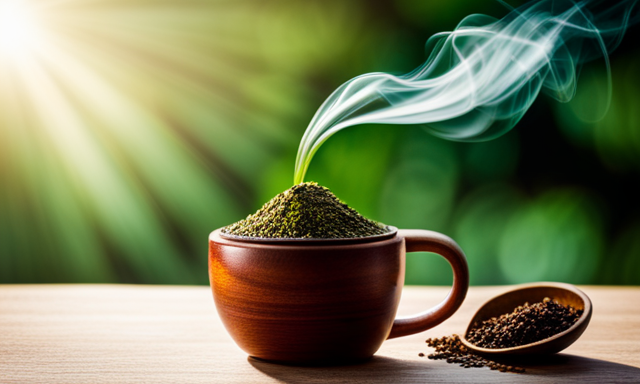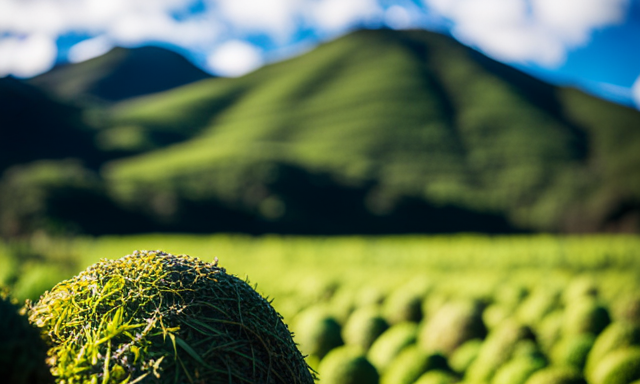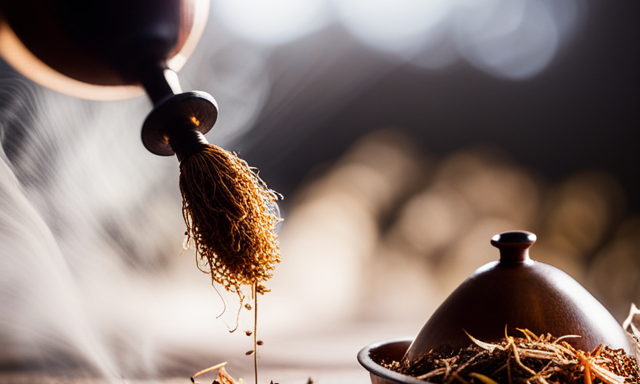Being a person who enjoys kicking off their morning with a warm tea or coffee, I’m constantly searching for new drinks to provide me with that additional morning energy surge. This curiosity peaked when I stumbled upon yerba mate, a herb from South America commonly prepared as a tea-like drink.
What makes yerba mate unique is its high caffeine content and reputation as a natural stimulant. But just how much caffeine does yerba mate contain? As it turns out, the answer isn’t quite straightforward.
In this article, we’ll explore everything you need to know about how much caffeine is in yerba mate, how it works in the body, and its potential health benefits and risks. So whether you’re curious about trying this popular herbal drink or simply want to learn more about its effects on your body and mind, read on to find out!
Key Takeaways
- Yerba Mate has a high caffeine content and is a natural stimulant, similar to coffee.
- Consuming too much caffeine over time can have negative long-term effects on the body.
- Yerba Mate contains antioxidants and nutrients that improve heart health, boost immunity, and aid digestion.
- It is important to consume Yerba Mate in moderation and to talk to a doctor before consuming if on medications related to blood pressure or heart health.
What Makes Yerba Mate Unique
What really sets yerba mate apart from other caffeinated beverages is its unique blend of stimulating compounds. Yerba mate is made from the leaves of a South American plant and boasts a distinct flavor profile that includes earthy and grassy notes.
This herbal infusion has been enjoyed for centuries in countries like Argentina, Uruguay, and Paraguay as part of their cultural heritage. The traditional preparation methods used to make yerba mate are also part of what makes it unique.
Unlike coffee or tea, yerba mate is brewed in a gourd with a metal straw called a bombilla. The drink is traditionally shared among friends and family, making it an important social ritual in many communities.
As we move into discussing the caffeine content in yerba mate, it’s worth noting that this stimulating beverage offers more than just an energy boost. Yerba mate’s unique flavors and cultural significance make it stand out among other caffeinated drinks on the market today.
Caffeine Content in Yerba Mate
The caffeine levels in yerba mate can vary depending on the brand and how it’s brewed, but it’s been found to contain about as much caffeine as a cup of coffee. This makes yerba mate a great alternative for those who want to reduce their coffee intake but still need the boost of caffeine.
Yerba mate is made from the leaves of the Ilex paraguariensis plant, which is mainly grown in South America, particularly in Argentina, Brazil, and Paraguay. Yerba mate cultivation has been an important part of South American culture for centuries. Traditionally consumed through a gourd and bombilla, yerba mate has gained popularity worldwide due to its health benefits and unique taste. However, with modernization comes convenience – many brands now offer yerba mate tea bags that make brewing easier.
When considering the caffeine content in yerba mate tea bags, it’s important to note that they may have slightly less caffeine compared to loose leaf yerba mate due to differences in processing. Nonetheless, drinking yerba mate can provide a similar energy boost as coffee without causing jitters or crashes later on. Understanding how caffeine works in the body can shed more light on why this is so beneficial.
How Caffeine Works in the Body
As you sip on your yerba mate, imagine the caffeine molecules making their way into your bloodstream and binding to adenosine receptors in your brain, tricking them into thinking you’re not tired. Caffeine is a natural stimulant found in many different types of sources like coffee, tea, chocolate, energy drinks, and yerba mate. It affects the central nervous system by blocking the neurotransmitter that makes us feel sleepy – adenosine.
While caffeine may have some benefits, such as increased alertness and improved cognitive performance when consumed in moderation, it also has its drawbacks if taken excessively. Some people may experience jitters, headaches, or anxiety from too much caffeine intake. It can also disrupt sleep patterns and cause dehydration due to its diuretic effect. Therefore, it’s important to be mindful of our caffeine consumption and listen to our bodies for any signs of discomfort.
Yerba mate is a popular alternative source of caffeine that offers additional health benefits compared to other sources like coffee or energy drinks. It contains antioxidants and nutrients that can improve heart health, boost immunity, and aid digestion. Moreover, the combination of naturally occurring compounds in yerba mate provides a smoother energy boost with fewer side effects than other caffeinated beverages.
In the next section, we’ll dive deeper into these health benefits of yerba mate.
Health Benefits of Yerba Mate
Sipping on yerba mate can provide a smoother energy boost with additional health benefits compared to other caffeinated beverages. Yerba mate contains caffeine, theobromine, and theophylline – three xanthines that work together to stimulate the body’s central nervous system. But aside from its energizing effects, yerba mate also has numerous health benefits.
Research shows that yerba mate can boost the immune system. It contains compounds called saponins which have anti-inflammatory and antioxidant properties that help strengthen the body’s natural defenses against infections and diseases. Yerba mate is also rich in vitamin C which further supports immunity. With regular consumption of yerba mate tea, you may be able to fend off common illnesses such as colds and flu more effectively.
In addition to its immunity-boosting properties, yerba mate is known for improving digestive health. The tea stimulates digestion by increasing bile production and promoting intestinal contractions. This helps prevent constipation, bloating, and other gastrointestinal problems. Yerba mate has also been shown to reduce inflammation in the gut lining which can alleviate symptoms of irritable bowel syndrome (IBS). So not only does it give you an energy boost but it also helps promote a healthy gut too!
While there are many potential benefits of consuming yerba mate, it’s important to be aware of its risks and side effects as well.
Risks and Side Effects
As I’m exploring yerba mate, it’s important to discuss potential risks and side effects. One key consideration is the caffeine content, which can cause jitters or insomnia in some individuals. It’s also important to be aware of possible interactions with medications, especially those related to blood pressure or heart health. To ensure the benefits of yerba mate are enjoyed without any adverse reactions, it’s crucial to follow safe consumption guidelines.
Remember to always be cautious when trying new things and to consult with a healthcare professional if you have any concerns.
Potential negative effects of caffeine
Be careful with how much caffeine you consume from yerba mate, as too much can cause jitters and anxiety, leaving you feeling like a jittery squirrel on a power line. Caffeine sensitivity varies from person to person and some individuals may be more sensitive than others. It’s important to be mindful of your own caffeine tolerance and limit your intake accordingly.
In addition to short-term effects such as jitters and anxiety, consuming too much caffeine over time can have negative long-term effects on the body. These include increased blood pressure, heart palpitations, and decreased bone density. It’s important to consume yerba mate in moderation and incorporate other healthy habits into your lifestyle to mitigate these potential negative effects. Moving onto the next section, it’s also important to consider how yerba mate interacts with medications.
Interaction with medications
If you’re taking any meds, it’s crucial to know how yerba mate interacts with them. Yerba mate contains caffeine and other compounds that may interact with certain medications. Therefore, it’s important to take medication precautions and talk to your doctor before consuming yerba mate if you’re on any medications.
Some potential interactions include increased blood pressure and heart rate when combined with stimulant medications such as Adderall or Ritalin. It can also interact with blood thinners like Warfarin, making them less effective or increasing the risk of bleeding. Additionally, some antidepressants may interact negatively with yerba mate due to its effects on serotonin levels in the brain.
Always consult your doctor or pharmacist for advice on whether it’s safe for you to consume yerba mate while taking certain medications.
When considering safe consumption guidelines for yerba mate, it’s important to keep in mind any potential interactions with medications. By being aware of medication precautions and talking to your healthcare provider beforehand, you can ensure a safer experience when consuming this popular South American beverage.
Safe consumption guidelines
To safely enjoy yerba mate, it’s important to follow consumption guidelines that take into account any potential interactions with medications. Yerba mate contains caffeine and other stimulants that can interact with certain prescription drugs, such as those used to treat anxiety or high blood pressure. It’s recommended to consult with a healthcare professional before consuming yerba mate if you’re taking any medications.
Additionally, pregnant women and children should be cautious when consuming yerba mate due to its caffeine content. The American College of Obstetricians and Gynecologists recommends limiting caffeine intake during pregnancy, including from sources like coffee, tea, and soda. For children, the American Academy of Pediatrics advises against consuming caffeinated beverages altogether.
As always, moderation is key when it comes to consuming yerba mate. When considering the potential health benefits of yerba mate for weight loss, it’s important to keep in mind that following safe consumption guidelines is crucial for overall wellbeing and effectiveness.
Yerba Mate and Weight Loss
As someone who’s interested in maintaining a healthy weight, I find the potential role of yerba mate in weight loss and management to be intriguing.
I’m curious how it compares to other weight loss supplements, and what supporting research and studies have been conducted on its effectiveness.
In this subtopic, we’ll explore these key points to gain a better understanding of how yerba mate may be able to help with weight management.
Role in weight loss and management
Yerba mate can aid in weight loss and management by boosting metabolism and reducing hunger pangs. It contains caffeine, theobromine, and theophylline that stimulate the central nervous system, leading to a higher metabolic rate and an increased energy expenditure. This means that your body burns more calories even when you’re at rest.
Coupled with healthy lifestyle choices and dietary habits, yerba mate can be a valuable tool in achieving weight loss goals. Drinking yerba mate before meals can also reduce appetite, making it easier to stick to a lower calorie diet. Incorporating yerba mate into your daily routine is a natural way to support your weight loss efforts without relying on synthetic supplements or extreme diets.
As we explore how yerba mate aids in weight loss and management, it’s important to compare its effects to those of other weight loss supplements.
Comparison to other weight loss supplements
When comparing it to other weight loss supplements, yerba mate’s natural ingredients make it a safer and more sustainable option. Many supplements on the market contain synthetic or harmful ingredients that can cause unwanted side effects. Yerba mate, on the other hand, is made from the leaves of a South American plant and contains caffeine, antioxidants, and minerals that have been shown to aid in weight loss.
In terms of supplement effectiveness, studies have shown that yerba mate can help boost metabolism and reduce appetite. However, it’s important to note that like any supplement or medication, proper dosage recommendations should be followed to ensure safety and effectiveness. Consulting with a healthcare professional before starting any new supplement regimen is always recommended.
With its natural ingredients and potential benefits for weight loss management, it’s no wonder why yerba mate has gained attention in recent years. But what does scientific research say about this popular beverage?
Supporting research and studies
You’re in luck because there’s a plethora of scientific research and studies that support the potential benefits of yerba mate as a weight loss supplement.
For starters, drinking yerba mate has been shown to improve sleep quality. This is important for those looking to lose weight since getting adequate rest is crucial for maintaining a healthy metabolism.
Additionally, yerba mate has been linked to improved heart health. Studies have found that consuming this South American beverage can lower blood pressure and reduce bad cholesterol levels in the body. These factors are essential when it comes to achieving and maintaining a healthy weight. By promoting better cardiovascular function, yerba mate may help individuals exercise more efficiently and effectively, leading to greater weight loss results.
Moving onto the next topic about yerba mate and mental health, it’s worth noting that this natural supplement may also offer some mental health benefits.
Yerba Mate and Mental Health
It’s important to note the potential impact that consuming caffeinated beverages like yerba mate can have on mental health. As someone who struggles with anxiety, I was curious about whether or not yerba mate could provide any relief from my symptoms.
After doing some research, I found that there are several ways in which drinking yerba mate may positively affect mental clarity and anxiety relief.
- Yerba mate contains compounds that have been shown to improve mood and cognitive function.
- The caffeine in yerba mate is known to stimulate the central nervous system, providing a boost of energy and focus.
- Yerba mate also contains theobromine, a compound found in chocolate that has been shown to improve mood and reduce anxiety.
- Research has suggested that drinking yerba mate may increase levels of neurotransmitters like dopamine and serotonin, which are associated with feelings of happiness and well-being.
While there is still more research needed to fully understand the relationship between yerba mate consumption and mental health benefits, these findings are promising.
In addition to potentially improving mental clarity and reducing anxiety symptoms, incorporating yerba mate into your daily routine may also provide an energy boost without the jitters commonly associated with coffee.
Moving forward into our discussion on ‘yerba mate and athletic performance’, it’s interesting to consider how this beverage might be able to enhance physical endurance and stamina.
Yerba Mate and Athletic Performance
As I’m exploring the benefits and risks of yerba mate, I’m interested in its potential effects on athletic performance.
Yerba mate seems to offer a range of health benefits, including increased energy and focus.
However, as with any substance, it’s important to consume it safely and effectively.
Moving forward, I’m curious to see what future research will reveal about yerba mate’s role in sports and exercise performance.
Summary of yerba mate benefits and risks
Despite its potential benefits, yerba mate consumption should be moderated due to the risks of increased risk of certain cancers and digestive issues. For example, a study found that individuals who consumed over one liter of yerba mate per week had an increased risk of esophageal cancer. However, traditional consumption methods such as drinking from a gourd with a metal straw may reduce these risks as it filters out some carcinogenic compounds.
To better understand the benefits vs risks of yerba mate consumption, I have created a table below outlining some key points. It is important to note that while there are many reported benefits, more research is needed to confirm their effectiveness and potential side effects.
| Benefits | Risks |
|---|---|
| Contains antioxidants and anti-inflammatory properties | Increased risk of certain cancers |
| May aid in weight loss and boost metabolism | Digestive issues such as diarrhea or constipation |
| Provides energy without jitters or crashes | Can interfere with iron absorption |
| May improve mental clarity and focus | High caffeine content can cause anxiety or sleep disturbances |
Moving forward, it’s crucial to consider both the positive and negative aspects when deciding on yerba mate consumption. In the next section, we will explore recommendations for safe and effective consumption.
Recommendations for safe and effective consumption
To safely and effectively enjoy the benefits of drinking yerba mate, it’s important to establish a ritual that incorporates traditional brewing methods with mindful consumption practices.
The recommended dosage for yerba mate is about 50-100mg of caffeine per serving, which is equivalent to one small cup or gourd. Timing also plays a crucial role in safe consumption as consuming large amounts of yerba mate too close to bedtime can disrupt sleep patterns.
It’s also important to be mindful when combining yerba mate with other beverages. While it’s safe to drink water alongside yerba mate, consuming other caffeinated drinks such as coffee or energy drinks can lead to excessive caffeine intake and potential negative side effects such as jitters and anxiety.
By following these recommendations for safe and effective consumption, you can reap the many benefits of drinking yerba mate without any adverse effects on your health.
As research continues on the potential benefits and risks associated with drinking yerba mate, future developments may include more standardized dosages and improved processing methods that preserve its unique antioxidants and nutrients.
Future research and potential developments
Looking ahead, I believe that future research will focus on exploring new processing methods for yerba mate. This is important because current processing methods can degrade the unique antioxidants and nutrients found in this beloved South American beverage. By developing new ways to process yerba mate, researchers may be able to preserve these beneficial compounds and make them more accessible to consumers around the world.
In addition to exploring new processing methods, there are also exciting potential developments on the horizon for yerba mate. Some researchers are investigating the possibility of using yerba mate as a functional ingredient in food products or supplements. Others are looking at its potential as a natural source of caffeine for use in energy drinks or pre-workout supplements.
As interest in this traditional beverage continues to grow, it’s likely that we’ll see many more innovative applications and uses for yerba mate in the years to come.
Frequently Asked Questions
What is the origin of yerba mate and how was it traditionally consumed?
Yerba mate is a traditional South American beverage with roots dating back to the indigenous Guaranà people. The plant grows naturally in the subtropical forests of Argentina, Brazil, and Paraguay and is scientifically known as Ilex paraguariensis.
Traditionally, the Guaranà people consumed yerba mate as a communal beverage during important social gatherings. They prepared it by steeping the leaves of the plant in a hollowed-out gourd with hot water and sipped it through a metal straw called a bombilla.
Today, yerba mate is still widely consumed in South America and has gained popularity around the world due to its unique flavor profile and potential health benefits.
Can drinking too much yerba mate cause caffeine overdose?
Drinking too much yerba mate can indeed cause caffeine overdose, especially for those with high caffeine sensitivity. While yerba mate does not contain as much caffeine as coffee, it still has a significant amount and should be consumed in moderation.
Potential health risks associated with excessive consumption of yerba mate include increased heart rate, high blood pressure, anxiety, insomnia, and digestive issues. It’s important to listen to your body and limit your intake if you experience any adverse effects.
As someone who enjoys the taste and benefits of yerba mate, I make sure to consume it responsibly to avoid any potential harm.
Are there any studies on the long-term effects of yerba mate consumption?
When it comes to yerba mate consumption, there have been various studies conducted on its long-term effects. These studies have looked at both the risks and benefits associated with consuming this beverage over an extended period of time.
From a cultural standpoint, yerba mate is significant in many indigenous traditions and social rituals. However, when consumed excessively, there are potential health risks that individuals should be aware of. Some of these risks include an increased risk for certain types of cancer and cardiovascular disease.
On the other hand, some studies suggest that regular consumption may provide certain health benefits such as improved cognitive function and reduced inflammation. Ultimately, while there is no clear consensus on the long-term effects of yerba mate consumption, it’s important to weigh both the potential risks and benefits before making a decision about incorporating it into your diet.
How does the taste of yerba mate compare to other caffeinated beverages?
When it comes to taste comparison, yerba mate has a unique flavor profile that sets it apart from other caffeinated beverages. Unlike coffee, which can be bitter and acidic, yerba mate has a smooth and earthy taste with subtle hints of sweetness. The flavor is often described as being similar to green tea or even tobacco.
In contrast, energy drinks tend to have an artificial and overpowering taste that can be overwhelming for some people. Overall, the taste of yerba mate offers a refreshing alternative for those looking for a more natural and mellow caffeine boost.
Is yerba mate safe for pregnant or breastfeeding women to consume?
As a healthcare professional, I advise pregnant and breastfeeding women to exercise caution when consuming yerba mate due to its caffeine content. While yerba mate is generally considered safe in moderate amounts, excessive consumption can lead to health risks such as increased heart rate and blood pressure.
Additionally, the taste of yerba mate may not be appealing to everyone and some may prefer other caffeinated beverages. It’s important for expectant or nursing mothers to prioritize their health and consult with their healthcare provider before incorporating yerba mate into their diet.
Conclusion
In conclusion, I’ve learned that yerba mate is a unique beverage with a distinct flavor and numerous health benefits. Its caffeine content is comparable to coffee, but it also contains other beneficial compounds such as antioxidants, vitamins, and minerals.
While too much caffeine can be harmful, moderate consumption of yerba mate has been linked to improved mental alertness, weight loss, and athletic performance.
On the other hand, it’s important to be aware of potential risks and side effects associated with excessive consumption or combining yerba mate with certain medications. As with any food or drink, moderation is key.
Overall, I’m impressed by the versatility of this South American tea and plan on incorporating it into my daily routine for its unique taste and potential health benefits.










